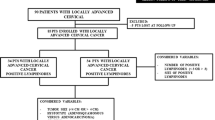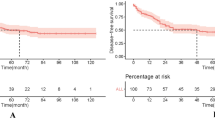Abstract
Purpose
Advanced cervical cancer with distant metastases is often difficult to treat and has an extremely poor prognosis. In this study, we aimed to examine treatment modalities that may contribute to prolonging overall survival.
Methods
Under institutional review board approval, we conducted a retrospective study of 91 patients with advanced cervical cancer with distant metastasis who were treated at our hospital from 2000 to 2018. Overall survival was analyzed for each of the following prognostic factors: age, local stage, histological type, metastatic morphology (hematogenous metastasis or lymphadenopathy), presence or absence of local treatment with surgery or radiotherapy, and use of bevacizumab.
Results
The median age was 58 years, and the median duration of observation was 34.5 months. The most common histological type was squamous cell carcinoma (64.8%). Eighty percent of patients opted for platinum-based chemotherapy as their first treatment. Univariate analysis detected histological type, metastatic morphology, presence or absence of local treatment with surgery or radiotherapy, and use of bevacizumab as significant prognostic factors, whereas multivariate analysis detected metastatic morphology, presence or absence of local treatment with surgery or radiotherapy, and use of bevacizumab as significant prognostic factors.
Conclusion
In advanced cervical cancer, distant metastases can be controlled with chemotherapy, and the prognosis is relatively good when combined with local treatment. The results suggest that combined treatment strategies may contribute to prolonged survival and that bevacizumab use may extend survival.


Similar content being viewed by others
Availability of Data and Materials
The datasets analyzed in the current study are available from the corresponding author on reasonable request.
References
Yagi A, Ueda Y, Kuroda M, et al. Epidemiologic and clinical analysis of cervical cancer using data from the population-based osaka cancer registry. Cancer Res. 2019;79:1252–9.
The report of the Gynecological Oncology Committee Jpn Society of Obst and Gynecol 2019;71:669–686 http://www.jsog-oj.jp/toc07105.php#. Accessed 11 Dec 2020.
Tewari KS, Sill MW, Long HJ 3rd, et al. Improved survival with bevacizumab in advanced cervical cancer. N Engl J Med. 2014;370:734–43.
Suzuki K, Nagao S, Shibutani T, et al. Phase II trial of paclitaxel, carboplatin, and bevacizumab for advanced or recurrent cervical cancer. Gynecol Oncol. 2019;154:554–7.
Sasano T, Mabuchi S, Kuroda H, et al. Predictors of survival in patients with FIGO stage IVB cervical cancer. Int J Gynecol Cancer. 2016;26:528–33.
Usami T, Takahashi A, Matoda M, et al. Review of treatment and prognosis of stage IVB cervical carcinoma. Int J Gynecol Cancer. 2016;26:1239–45.
Kim YS, Kim JH, Ahn SD, et al. High-dose extended-field irradiation and high-dose rate brachytherapy with concurrent chemotherapy for cervical cancer with positive para-aortic lymph nodes. Int J Radiat Oncol Biol Phys. 2009;74:1522–8.
Wu SY, Huang EY, Chanchien CC, et al. Prognostic factors associated with radiotherapy for cervical cancer with computed tomography-detected para-aortic lymph node metastasis. J Radiat Res. 2014;55:129–38.
Yoon HI, Cha J, Keum KC, et al. Treatment outcomes of extended-field radiation therapy and the effect of concurrent chemotherapy on uterine cervical cancer with para-aortic lymph node metastasis. Radiat Oncol. 2015;13:18.
Chung HC, Ros W, Delord JP, et al. Efficacy and safety of pembrolizumab in previously treated advanced cervical cancer: results from the phase II KEYNOTE-158 study. J Clin Oncol. 2019;10:1470–8.
Shapira-Frommer R, Alexandre J, Monk BJ, et al. KEYNOTE-826: a phase 3, randomized, double-blind, placebo-controlled study of pembrolizumab plus chemotherapy for first-line treatment of persistent, recurrent, or metastatic cervical cancer. J Clin Oncol. 2019. https://doi.org/10.1200/JCO.2019.37.15_suppl.TPS5595.
Oaknin A, Gladieff L, Colombo N, et al. BEATcc (ENGOT-Cx10/GEICO 68-C/GOG3030/JGOG1084): a randomized, open label, phase III study of cisplatin and paclitaxel chemotherapy with bevacizumab (CTx plus B) with or without atezolizumab (Atz) as first-line treatment for metastatic, persistent, or recurrent (m/r) carcinoma of the cervix (CCx). J Clin Oncol. 2019. https://doi.org/10.1200/JCO.2019.37.15_suppl.TPS5594.
Perkins V, Moore K, Vesely S, et al. Incorporation of whole pelvic radiation into treatment of stage IVB cervical cancer: a novel treatment strategy. Gynecol Oncol. 2020;156:100–6.
Venigalla S, Guttmann DM, Horne ZD, et al. Definitive local therapy associated with improved overall survival in metastatic cervical cancer. Pract Radiat Oncol. 2018;8:e377–85.
Wang Y, Farmer M, Izaguirre EW, et al. Association of definitive pelvic radiation therapy with survival among `patients with newly diagnosed metastatic cervical cancer. JAMA Oncol. 2018;4:1288–91.
Acknowledgements
This study was partially supported by Hyogo Cancer Center. We also thank H. Nikki March, PhD, and Andrea Baird, MD, from Edanz Group (https://en-author-services.edanz.com/ac) for editing a draft of this manuscript.
Funding
Not applicable.
Author information
Authors and Affiliations
Contributions
All authors oversaw and treated each patient in this study. MK wrote the main manuscript. SN, KT, and SY read the article and contributed suggestions.
Corresponding author
Ethics declarations
Conflict of interest
The authors declare no conflict of interest.
Ethics Approval, Consent to Participate, and Consent for Publication
Written informed consent was obtained from all patients, and this study was approved by the institutional review board of Hyogo Cancer Center according to the ethical standards laid down in the Declaration of Helsinki.
Additional information
Publisher's Note
Springer Nature remains neutral with regard to jurisdictional claims in published maps and institutional affiliations.
Supplementary Information
Below is the link to the electronic supplementary material.
Rights and permissions
About this article
Cite this article
Kitai, M., Nagao, S., Tsujino, K. et al. Prognostic Factors of Advanced Cervical Cancer with Distant Metastasis. Indian J Gynecol Oncolog 19, 31 (2021). https://doi.org/10.1007/s40944-021-00509-9
Received:
Revised:
Accepted:
Published:
DOI: https://doi.org/10.1007/s40944-021-00509-9




